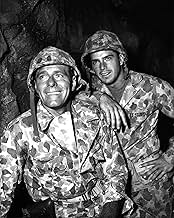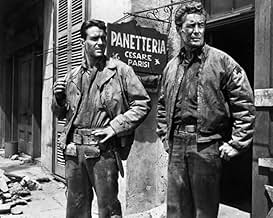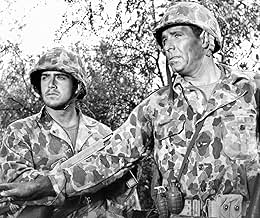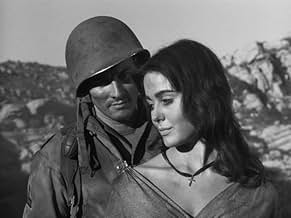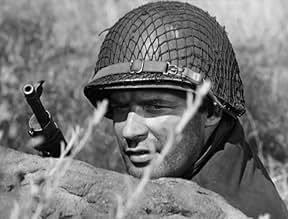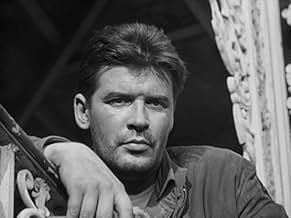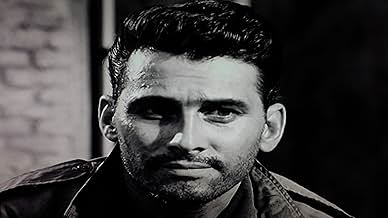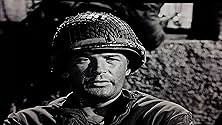Ajouter une intrigue dans votre langueThe 36th infantry is fighting its way through Italy under the spirited leadership of Captain Jim Benedict. His men include flirt D'Angelo, who carries his guitar along, plus pals Lucavich an... Tout lireThe 36th infantry is fighting its way through Italy under the spirited leadership of Captain Jim Benedict. His men include flirt D'Angelo, who carries his guitar along, plus pals Lucavich and Hanson. McKenna is the free wheeling Sergeant.The 36th infantry is fighting its way through Italy under the spirited leadership of Captain Jim Benedict. His men include flirt D'Angelo, who carries his guitar along, plus pals Lucavich and Hanson. McKenna is the free wheeling Sergeant.
Parcourir les épisodes
Avis à la une
The pilot of "Combat" was not as well made as the pilot of "The Gallant Men".
Robert Altman directed the pilot of "The Gallant Men". He was key in casting all the regulars. Boris Sagal ("Rich Man, Poor Man") directed the pilot for "Combat", but never did another episode. The producers of "Combat" hated the look of their pilot and loved the look of the "Gallant Men" pilot. The producers convinced Altman to move over to "Combat" as a producer-writer-director. Altman did some of his best work on the first season of "Combat", and he got the series off to a superb start. Altman says on a "Combat" DVD commentary of an episode with Albert Salmi that he never got better than that as a director. Altman also said that "Combat" had a better cast than "The Gallant Men", even though he cast "The Gallant Men" and had nothing to do with casting "Combat".
"The Gallant Men" was probably suggested by "The Story of G.I. Joe" (1945) where Burgess Meredith played war correspondent Ernie Pyle and Robert Mitchum played an infantry captain. In "The Gallant Men", Robert McQueeney was top billed as war correspondent Conley Wright.
"The Gallant Men" focused on a company while "Combat" focused on a single squad. The squad level turned out to be the ideal vehicle to tell war stories and to allow the viewer to get close to the characters. "Combat" also benefited from having one of the 1960's best series performances: Vic Morrow as Sergeant Saunders. Morrow was nominated for an Emmy for the first season of "Combat", but lost to E.G. Marshall ("The Defenders"). "Combat" also hired superb guest stars that Warner Brothers would never pay up for: Jeffrey Hunter, Lee Marvin, James Coburn, Rip Torn, John Cassavetes and many others. And finally, "Combat" paid for better writers and wound up with much better scripts.
Warner Brothers was a very cheap outfit, although they often did manage to make compelling shows.
Robert Conrad gave an excellent guest star performance on "The Gallant Men" as a sergeant who was the brother of series hero Captain Benedict (well played by William Reynolds.) Robert Conrad might have been brilliant as a tough squad leader, maybe even as good as Vic Morrow. Conrad should have been brought in as the new series star. The show should have focused on Conrad's squad rather than the company. The most appealing regular on "The Gallant Men" was 23-year old Roger Davis as Private Gibson. Conrad could bring Gibson along from episode to episode until finally Gibson is given a battlefield commission and becomes Conrad's platoon leader. This could have led to a strongly written and played relationship that could have given the show a dramatic center-something it badly needed.
Robert Altman's original conception for "The Gallant Men" was to kill off the regulars from week to week. This was a fascinating idea that could have made the series very realistic and emotionally involving. If Robert Altman had stayed on board, "The Gallant Men" might have given "Combat" a run for its money.
Robert Altman directed the pilot of "The Gallant Men". He was key in casting all the regulars. Boris Sagal ("Rich Man, Poor Man") directed the pilot for "Combat", but never did another episode. The producers of "Combat" hated the look of their pilot and loved the look of the "Gallant Men" pilot. The producers convinced Altman to move over to "Combat" as a producer-writer-director. Altman did some of his best work on the first season of "Combat", and he got the series off to a superb start. Altman says on a "Combat" DVD commentary of an episode with Albert Salmi that he never got better than that as a director. Altman also said that "Combat" had a better cast than "The Gallant Men", even though he cast "The Gallant Men" and had nothing to do with casting "Combat".
"The Gallant Men" was probably suggested by "The Story of G.I. Joe" (1945) where Burgess Meredith played war correspondent Ernie Pyle and Robert Mitchum played an infantry captain. In "The Gallant Men", Robert McQueeney was top billed as war correspondent Conley Wright.
"The Gallant Men" focused on a company while "Combat" focused on a single squad. The squad level turned out to be the ideal vehicle to tell war stories and to allow the viewer to get close to the characters. "Combat" also benefited from having one of the 1960's best series performances: Vic Morrow as Sergeant Saunders. Morrow was nominated for an Emmy for the first season of "Combat", but lost to E.G. Marshall ("The Defenders"). "Combat" also hired superb guest stars that Warner Brothers would never pay up for: Jeffrey Hunter, Lee Marvin, James Coburn, Rip Torn, John Cassavetes and many others. And finally, "Combat" paid for better writers and wound up with much better scripts.
Warner Brothers was a very cheap outfit, although they often did manage to make compelling shows.
Robert Conrad gave an excellent guest star performance on "The Gallant Men" as a sergeant who was the brother of series hero Captain Benedict (well played by William Reynolds.) Robert Conrad might have been brilliant as a tough squad leader, maybe even as good as Vic Morrow. Conrad should have been brought in as the new series star. The show should have focused on Conrad's squad rather than the company. The most appealing regular on "The Gallant Men" was 23-year old Roger Davis as Private Gibson. Conrad could bring Gibson along from episode to episode until finally Gibson is given a battlefield commission and becomes Conrad's platoon leader. This could have led to a strongly written and played relationship that could have given the show a dramatic center-something it badly needed.
Robert Altman's original conception for "The Gallant Men" was to kill off the regulars from week to week. This was a fascinating idea that could have made the series very realistic and emotionally involving. If Robert Altman had stayed on board, "The Gallant Men" might have given "Combat" a run for its money.
I watched this show with my father as a small child. He was a BAR man in an infantry squad. I liked Gallant Men much more than Combat as in Combat, you know the core group would never get killed and the music was very predictable. The Gallant Men was like what my pop experienced he said. Brief intense battles followed by lulls where you tried to find something to do without getting killed. The show gave characters more depth and the battles were more realistic than Combat. The men also appeared at times to really be in fear of their life instead of just acting. I recently acquired the entire series on DVD's and it is even better than I remember it.
I haven't seen this show since it originally aired on ABC in 1962. I was 11 years old and it seemed like everybody's dad was a WWII vet. We played "army" using original equipment, including Lugers and Nambus! I remember this show as being fairly vivid. It must have made an impression on me because I still watch war flicks, some 40 years later. My question is: where can this series be viewed or purchased? Help, anyone?
It seems with all the forces going against this series, it wasn't surprising it only lasted 26 episodes. The networks really struggled against each other for high rated shows at prime time 7pm to 10pm for me. Altman was much more needed then only directing the pilot. ABC had a better eye on Combat having a better production team, big name guest host every episode, & a cast that worked exceptionally well. William Reynolds admitted he didn't have the drive to become a better actor. Vic Morrow on the other hand took the show over Rick Jason even though both agreed to split top credit. Warner Brothers wouldn't take on guest hosting like Combat did. The competition for prime time slots was furious with shows like Jackie Gleason..... The Gallant Men could of lasted longer had there been more money to doe out. The cast was good & Reynolds also. He left acting early, just lacked personal desire to become a career actor even though he had what it took to be one with his looks on his side. Gallant Men was a good show fighting the war in Italy. The war affected every country in Europe, not just France. Combat covered that country. There was many battles in Italy, where one of my uncles fought. I read a review regarding Robert Conrad being casted into the Gallant Men, yea that would be one of a few more things they could of kept TGM on TV longer. Combat focused on a squad & TGM should of done the same but added two more regular characters. Again this is a money matter. Italy had a lot of mountain battles where writing some episodes tied together in two parts would of really made some great episodes, a string of them. Story telling in a series is a must to have good writers. I believe with a bigger number of cast members where the likes of a Robert Conrad would of fit in snuggly & fighting in Sicily also another major battle ground gave TGM more lasting. There was a lot of actors to hire for the show. Richard Boone, Ty Harding, Peter Brown, Peter Breck, comes to mind. I do not think that two TV WW II series running different days of the week would of tired audiences. Both being in different countries. Look at the decade of the 1950s of Westerns on every channel & network 7 days a week. .
The Gallant Men was Warner Brother's contribution tot he War genre of the early 60's, featuring many of the same contract players who had appeared in their western and detective series. It was a sort of rival of Combat, which premiered on the same network in the same year but which was produced by a different company. I was a kid then and my family started out watching The Gallant Men but began watching Combat when the former was canceled. I liked The Gallant Men very much but spent much of my childhood humming the "Combat March" with my friends, who always instantly recognized it.
I'd have to pick Combat as the better show because it's more consistently good but they shows are by their nature very similar and a good "Gallant Men" is as good as a good Combat. It's just that there are fewer of them. The writing, directing and acting on Combat is more consistently good. The characters are a little stronger overall, as well. Vic Morrow's Sgt. Chip Saunders is one oft he classic TV characters of all time. Rick Jason's Lt. Gil Hanley is almost as good, (but forgotten by many, for some reason). Jack Hogan's Kirby is also memorable. Pierre Jalbert as Caje and Dick Peabody as Littlejohn, (and he's the right size for it), offer strong support. The one thing The Gallant Men has is a sardonic narrator, Robert McQueeney's war correspondent, Conley Wright. William Reynolds is a forceful Captain Benedict. Robert Ridgely is OK as Lt. Kimbro. Eddie Fontaine is good as the wheeler's dealer of the unit, Pvt. DeAngelo, but not as good as Hogan's similar Pvt. Kirby on Combat. Roland LaStarza, a former boxer who once got KO'ed by Rocky Marciano, has some good comic moments as Lucavich, but isn't much of an actor. (In one show, the soldiers talk about what they expected war to be like. Lucavich said he thought they might name a country after him. "A country named Lucavich?!?", says DeAngelo.) Both shows were popular at the time but ABC decided they needed only one war show on it's schedule and Combat was getting the better ratings at the time so The Gallant Men was canceled after only one year. It was very disappointing to me. I had hopes that the two shows would work their way to the end of the war and meet up with each other in Germany. As it was The Gallant Men never made it to the end of the war and the Combat crew fought on for 5 years, which hardly seems fair, considering that the actually length of time from the Normandy invasion to V-E Day was only ten months. No wonder they complained about the war dragging on.
One thing the two shows had in common was the dilemma they faced in each battle. Obviously, a fire fight between a squad of American soldiers who are regulars in a TV show and a squad of German troops who are not is going to be rather one sided. The war could not have been that easy. So, if you see a guy in an American uniform who isn't one of the regulars, kiss him goodbye...
I'd have to pick Combat as the better show because it's more consistently good but they shows are by their nature very similar and a good "Gallant Men" is as good as a good Combat. It's just that there are fewer of them. The writing, directing and acting on Combat is more consistently good. The characters are a little stronger overall, as well. Vic Morrow's Sgt. Chip Saunders is one oft he classic TV characters of all time. Rick Jason's Lt. Gil Hanley is almost as good, (but forgotten by many, for some reason). Jack Hogan's Kirby is also memorable. Pierre Jalbert as Caje and Dick Peabody as Littlejohn, (and he's the right size for it), offer strong support. The one thing The Gallant Men has is a sardonic narrator, Robert McQueeney's war correspondent, Conley Wright. William Reynolds is a forceful Captain Benedict. Robert Ridgely is OK as Lt. Kimbro. Eddie Fontaine is good as the wheeler's dealer of the unit, Pvt. DeAngelo, but not as good as Hogan's similar Pvt. Kirby on Combat. Roland LaStarza, a former boxer who once got KO'ed by Rocky Marciano, has some good comic moments as Lucavich, but isn't much of an actor. (In one show, the soldiers talk about what they expected war to be like. Lucavich said he thought they might name a country after him. "A country named Lucavich?!?", says DeAngelo.) Both shows were popular at the time but ABC decided they needed only one war show on it's schedule and Combat was getting the better ratings at the time so The Gallant Men was canceled after only one year. It was very disappointing to me. I had hopes that the two shows would work their way to the end of the war and meet up with each other in Germany. As it was The Gallant Men never made it to the end of the war and the Combat crew fought on for 5 years, which hardly seems fair, considering that the actually length of time from the Normandy invasion to V-E Day was only ten months. No wonder they complained about the war dragging on.
One thing the two shows had in common was the dilemma they faced in each battle. Obviously, a fire fight between a squad of American soldiers who are regulars in a TV show and a squad of German troops who are not is going to be rather one sided. The war could not have been that easy. So, if you see a guy in an American uniform who isn't one of the regulars, kiss him goodbye...
Le saviez-vous
- ConnexionsReferenced in Svengoolie: The Land Unknown (2014)
Meilleurs choix
Connectez-vous pour évaluer et suivre la liste de favoris afin de recevoir des recommandations personnalisées
- How many seasons does The Gallant Men have?Alimenté par Alexa
Détails
- Durée1 heure
- Couleur
- Rapport de forme
- 1.33 : 1
Contribuer à cette page
Suggérer une modification ou ajouter du contenu manquant

Lacune principale
By what name was The Gallant Men (1962) officially released in Canada in English?
Répondre
